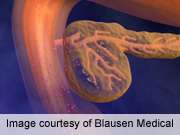High total, animal protein intake ups type 2 diabetes risk

(HealthDay)—High total and animal protein intake correlates with increased incidence of type 2 diabetes, according to a study published online April 10 in Diabetes Care.
Monique van Nielen, Ph.D., from Wageningen University in the Netherlands, and colleagues examined the long-term association between total, animal, and plant protein intake and the incidence of type 2 diabetes. Data were collected from 12,403 cases with incident type 2 diabetes from the European Prospective Investigation into Cancer and Nutrition-InterAct case-cohort study, and a stratified subcohort of 16,154 individuals from eight European countries. Participants were followed for an average of 12.0 years.
The researchers found that the incidence of type 2 diabetes was increased for those with high intake of total protein (per 10 g: hazard ratio [HR], 1.06: Ptrend < 0.001) and animal protein (per 10 g: HR, 1.05; Ptrend = 0.001), after adjustment for important diabetes risk factors and dietary factors. The effect was modified by sex (P < 0.001) and by body mass index (BMI) among women (P < 0.001). The correlations were stronger among women, especially obese women with a BMI >30 kg/m² (per 10 g animal protein: HR, 1.19) and were not significant for men. There was no correlation between plant protein intake with type 2 diabetes (per 10 g: HR, 1.04; Ptrend = 0.098).
"In view of the rapidly increasing prevalence of type 2 diabetes, limiting isoenergetic diets high in dietary proteins, particularly from animal sources, should be considered," the authors write.
More information:
Abstract
Full Text (subscription or payment may be required)
Copyright © 2014 HealthDay. All rights reserved.



















